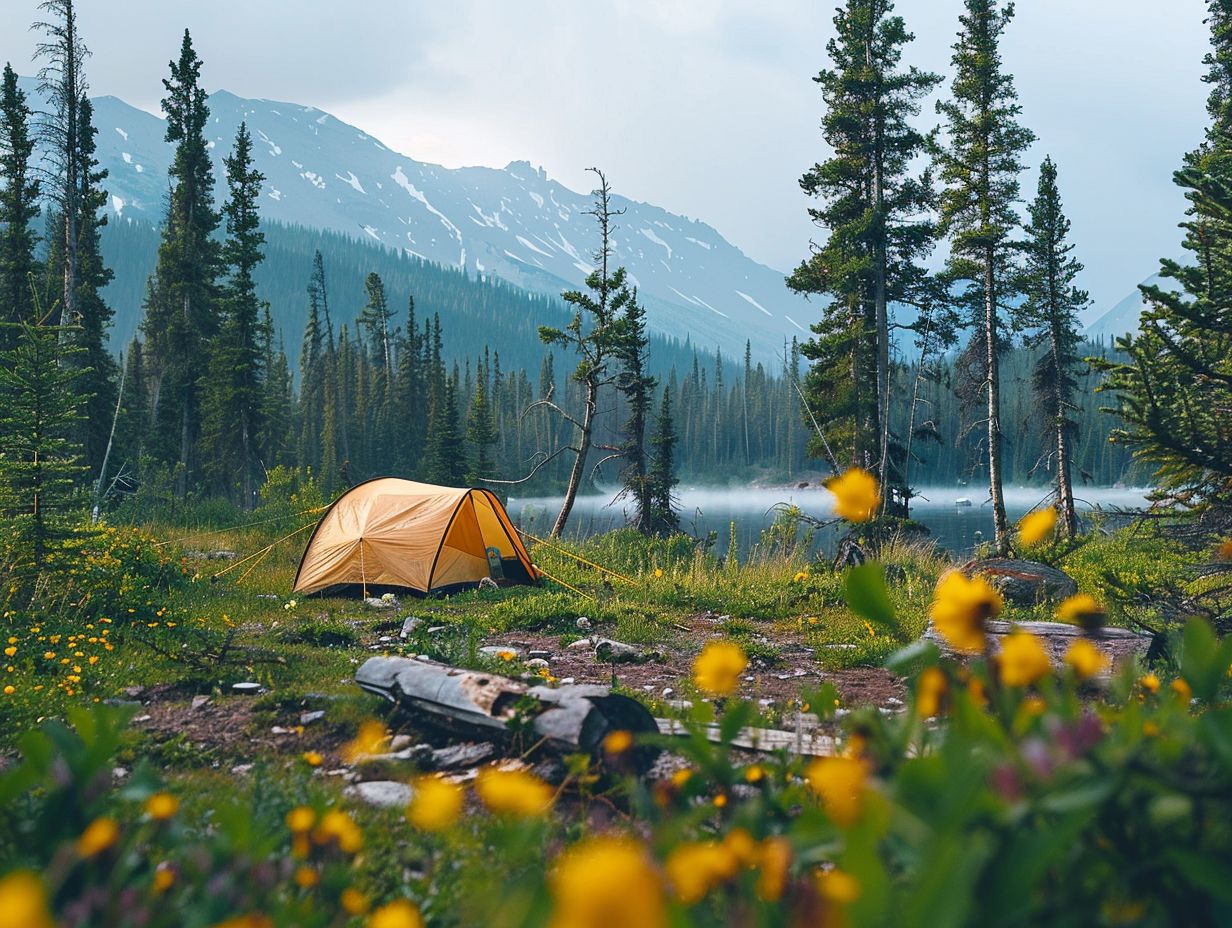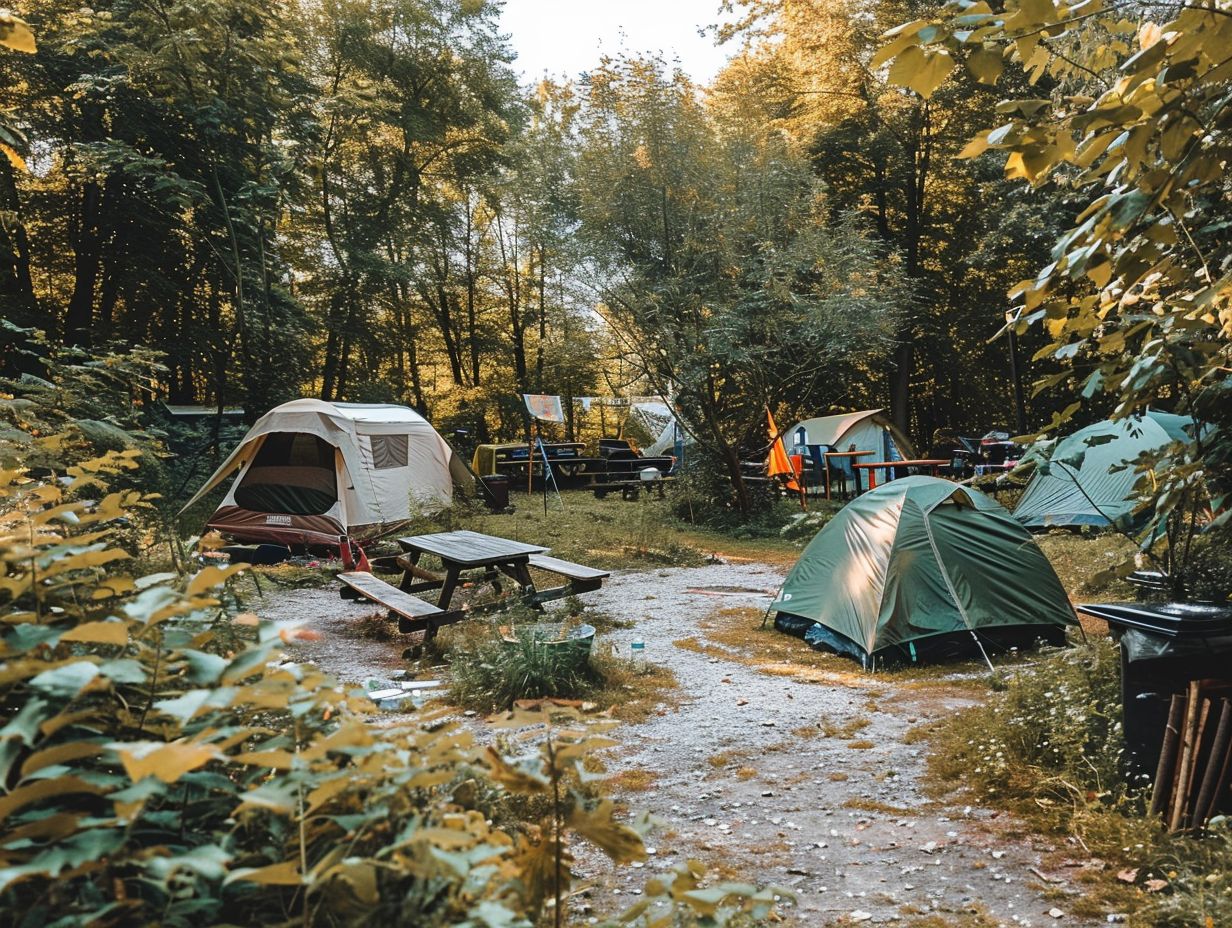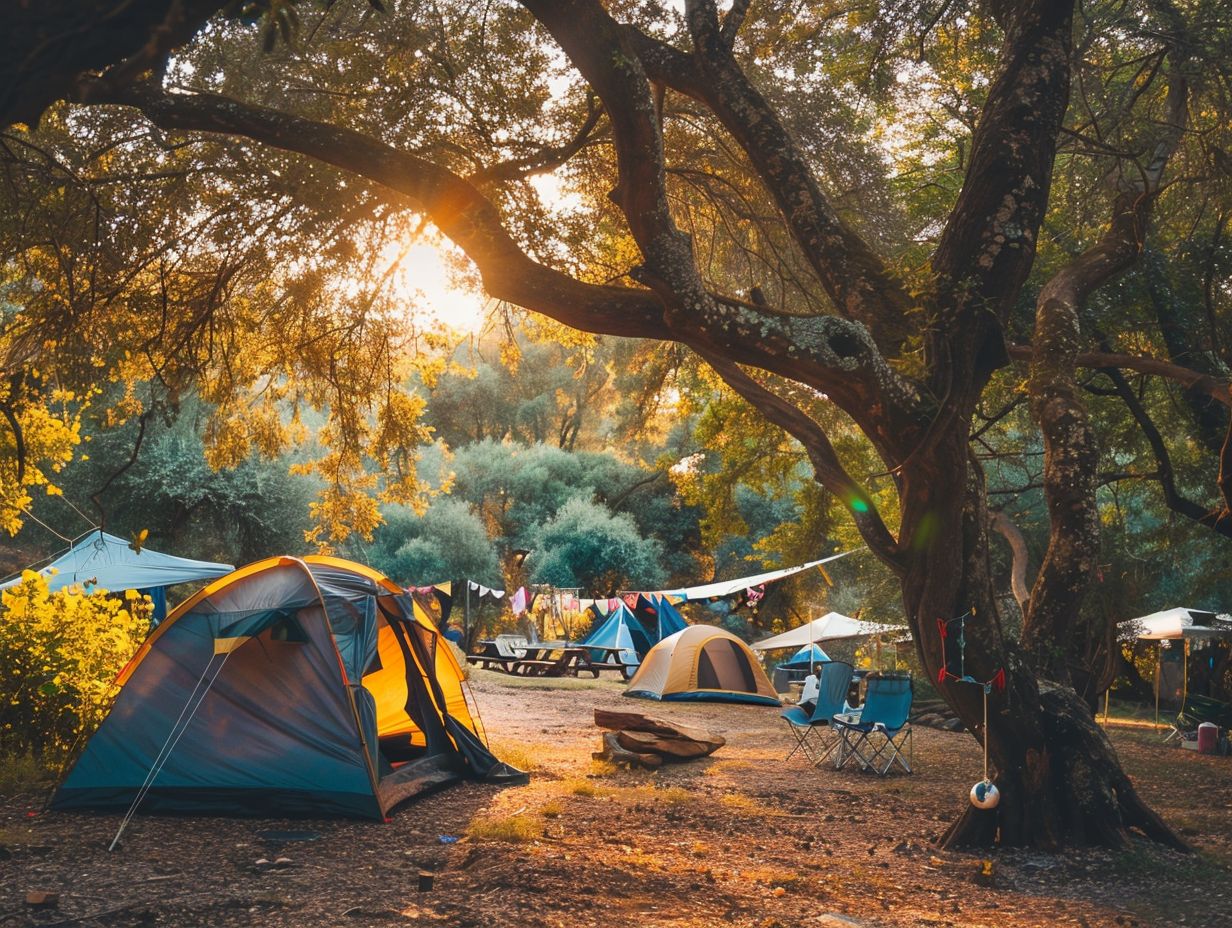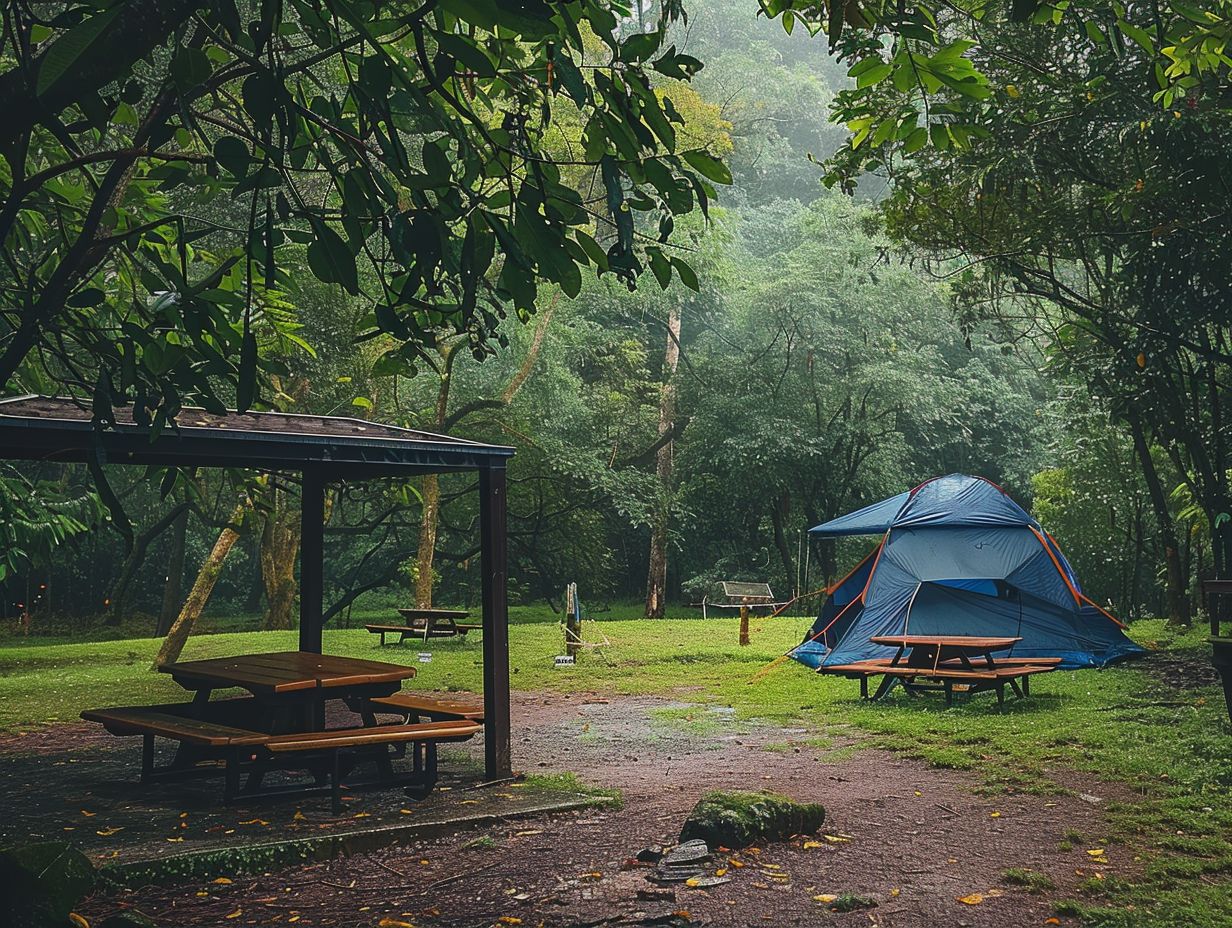If you are a nature lover who enjoys spending time outdoors camping, it is crucial to keep your campsite clean to preserve the beauty of nature and show respect for the environment. Here are 15 valuable tips provided for maintaining a clean campsite.
These tips cover various aspects, including waste management, respecting wildlife, and minimising noise pollution. By following these guidelines, you can be a responsible camper and ensure that you leave no trace behind. Take the time to learn how you can make a positive impact during your next outdoor adventure.
Key Takeaways:

- Plan ahead and bring necessary waste management supplies to keep your campsite clean.
- Use reusable containers and utensils to minimise waste and reduce your impact on the environment.
- Pack out everything you bring in to leave the campsite in better condition than you found it.
Plan Ahead for Waste Management
Before embarking on your camping adventure, it is essential to plan ahead for effective waste management at your campsite.
Proper preparation can ensure a clean camping environment and minimise your impact on nature. Utilise resources from Love the Outdoors and adhere to Leave No Trace principles to preserve the beauty of the wilderness.
By implementing simple strategies such as packing reusable containers for food and beverages, you can significantly reduce the amount of waste produced during your trip. Setting up designated recycling bins for items like plastic bottles and aluminium cans can help promote recycling practices.
In terms of disposing of rubbish, remember to follow the ‘pack it in, pack it out‘ rule, ensuring that you leave no litter behind. Taking these small yet impactful steps not only maintains the natural beauty of the outdoors but also sets a positive example for future campers to respect and protect our environment.
2. Use Reusable Containers and Utensils
When packing your camping supplies, consider opting for reusable containers and utensils to decrease waste and lessen your environmental impact. By investing in durable products such as Rubbermaid storage containers and high-quality utensils, you can significantly reduce the use of single-use plastics during your outdoor escapades.
Not only do these choices aid in preserving the environment, but they also contribute to long-term cost-effectiveness. Brands like Kuju Coffee offer innovative solutions like reusable coffee filters that eliminate the need for disposable alternatives during your camping trips.
The eco-friendliness of using these sustainable products goes beyond your immediate adventure, as it helps decrease your overall carbon footprint.
By incorporating small changes such as selecting reusable containers and sturdy utensils, you actively engage in reducing plastic waste while benefiting from dependable and environmentally conscious camping equipment.
3. Pack Out What You Pack In
One of the golden rules of camping is to pack out what you pack in, leaving no trace of your presence in the wilderness. By adhering to the ‘pack in, pack out‘ rule, you can significantly reduce your environmental impact by ensuring that all waste is properly disposed of.
Responsible waste disposal is crucial in maintaining the integrity of natural habitats, as rubbish left behind can harm wildlife and disrupt ecosystems.
This practice not only keeps your campsite clean but also protects local wildlife and preserves the natural beauty of Frontcountry areas for future generations to enjoy.
Not only does this promote a cleaner and more sustainable camping experience, but it also fosters a deeper respect for the outdoors and encourages a more eco-conscious mindset among outdoor enthusiasts.
4. Dispose of Waste Properly
Proper waste disposal is crucial for keeping your campsite clean and preventing water source contamination.
When managing waste water, consider utilising tools such as Prepworks collapsible dishwashing bins to ensure responsible handling. Adhere to designated disposal guidelines consistently to uphold environmental safety standards.
Greywater, which encompasses wastewater from activities like dishwashing and bathing, should be gathered in suitable containers to prevent the pollution of nearby streams or lakes.
Solid waste, which includes food scraps and packaging materials, must be stored properly in sealed bins to deter wildlife attraction and litter accumulation.
To minimise the introduction of harmful chemicals into the environment, contemplate using biodegradable soaps and cleaning products. Always bear in mind that safeguarding water sources is vital not only for your own enjoyment of the outdoors but also for the welfare of wildlife and the satisfaction of future visitors to the area.
5. Keep Food and Trash Secure

To avoid attracting unwanted visitors such as bears and other wildlife, it is imperative that you keep your food and rubbish securely stored at your campsite.
Invest in a bear-proof container for food storage and always dispose of rubbish in designated bins to prevent potential wildlife conflicts. Proper food and rubbish storage is not only essential for your safety but also for the well-being of the wildlife around you.
When camping in bear country, it is important to remember that bears have a strong sense of smell and can be attracted to odours from miles away. Minimise odours by double-bagging strong-smelling items, such as food scraps, and storing them in airtight containers.
Avoid cooking and eating near your sleeping area, as food smells can linger and attract bears. By adopting these practices, you can reduce the chances of bear encounters and help protect both yourself and the wildlife.
6. Use Biodegradable Products
When camping, consider opting for biodegradable products like Dr. Bronner’s soap or Dawn dishwashing liquid to minimise the environmental impact of cleaning at your campsite. These eco-friendly alternatives naturally break down, reducing harm to ecosystems and water sources.
By choosing biodegradable products such as Dr. Bronner’s and Dawn, you not only help in preserving the environment but also align with Leave No Trace principles, ensuring that your camping experience leaves minimal impact on nature.
These brands are recognized for their commitment to sustainability and provide effective cleaning solutions that are environmentally friendly. Selecting these products allows you to maintain a clean campsite without the worry of contributing to pollution or disrupting the delicate balance of the ecosystems you are exploring.
7. Follow Leave No Trace Principles
When enjoying the great outdoors, it is essential for you to follow Leave No Trace principles to minimise your environmental impact and preserve the natural beauty of wilderness areas. By respecting nature and practicing responsible outdoor ethics, you contribute to the sustainability of our precious ecosystems.
These principles serve as guidelines for responsible recreation and conservation, promoting a harmonious coexistence between outdoor enthusiasts and the environment.
The seven principles cover topics such as planning ahead and preparing properly, disposing of waste properly, minimising campfire impacts, respecting wildlife, and being considerate of other visitors.
By adhering to these principles while camping, you are actively participating in the protection of natural landscapes and ensuring that future generations can also enjoy the splendor of the wilderness.
8. Clean Up After Pets
When bringing pets along on your camping trip, it is important to maintain a sanitary and pleasant environment for fellow campers by cleaning up after them. Responsible pet ownership entails proper waste disposal and respectful behaviour towards other visitors and wildlife in the area.
Ensure you have waste bags on hand to promptly pick up your pet’s waste. It is also crucial to identify designated disposal areas for pet waste if they are available at the campsite or park.
By adhering to these straightforward guidelines, you not only help in preserving a cleaner environment but also demonstrate consideration for other outdoor enthusiasts who are sharing the space with you.
9. Respect Wildlife and Their Habitat
Whilst camping, you should always demonstrate respect for wildlife and their natural habitat, especially in diverse ecosystems like those at destinations such as Broken Head Holiday Park.
It is important to observe animals from a safe distance and refrain from feeding or disturbing them in order to preserve the delicate balance of local ecosystems.
Being mindful of your environmental impact and recognising the importance of wildlife preservation allows you to contribute to the conservation of natural habitats while camping.
Engaging in responsible wildlife viewing entails appreciating animals in their natural environment without causing any harm or distress.
It is essential to adhere to guidelines on how to interact with wildlife respectfully, avoiding behaviours that could disrupt their natural behaviour or endanger their well-being.
As campers, you have a crucial role in fostering coexistence between humans and wildlife through ethical conduct and active support for conservation initiatives.
10. Properly Extinguish Campfires

When you’re wrapping up your camping trip, it is crucial to minimise the risk of forest fires and uphold the safety of the surrounding environment. Adhering to fire safety protocols and thoroughly soaking the embers with water is imperative to ensure that your campsite is left free of hazards.
Before extinguishing the campfire, it’s important to have a bucket of water within reach and slowly pour water over the fire, beginning at the edges and moving towards the centre. Use a shovel to mix the ashes and embers, making sure that all areas are saturated and cooled.
Subsequently, carefully check for any remaining hot spots by using the back of your hand close to the fire pit. Always remember never to leave a campfire unattended and always verify that the fire is fully extinguished before departing.
11. Minimise Noise Pollution
Maintaining a peaceful atmosphere at your campsite involves minimising noise pollution and respecting the tranquillity of nature. By keeping conversations and activities at an appropriate volume, you contribute to a relaxing environment for yourself and fellow campers to enjoy.
Excessive noise can disrupt the natural habitats of wildlife, causing stress and behavioural changes in animals. Loud noises can disturb other campers, interfering with their enjoyment of the great outdoors.
To mitigate these impacts, consider establishing designated quiet hours at your campsite to ensure that everyone can unwind and appreciate the sounds of nature. Implementing noise reduction strategies such as using headphones, lowering music volume, and refraining from loud activities during quiet hours can help foster a serene and harmonious camping experience for all.
12. Keep Personal Hygiene in Mind
Maintaining personal hygiene is crucial for you during camping trips to ensure that you stay healthy and comfortable in outdoor environments. Consider setting up an outdoor shower area or using biodegradable cleansing agents to keep yourself clean and fresh while enjoying the beauty of nature.
You should prioritize using eco-friendly toiletries as a camper to minimise your impact on the environment. Opt for biodegradable soap, shampoo, and toothpaste to ensure that runoff water does not harm local ecosystems. Properly managing waste water is also essential to prevent contamination and preserve campsite cleanliness.
Always dispose of greywater in designated areas and avoid dumping it directly onto the ground. By respecting shared facilities and following Leave No Trace principles, you can contribute to maintaining the natural beauty of the campsite for future visitors.
Leave the Campsite Better Than You Found It
A fundamental principle of responsible camping is to leave the campsite better than you found it, demonstrating good stewardship of natural resources and respect for the environment.
By dedicating time to clean up any litter or debris, you contribute to maintaining a pristine and welcoming outdoor space for all visitors.
Taking care of the campsite can be as simple as properly disposing of rubbish, ensuring that food items are securely stored to prevent wildlife disturbances, and leaving natural surroundings undisturbed.
These small acts of kindness and cleanliness collectively enhance the overall camping experience for everyone who comes after you, fostering a sense of community and responsibility among campers. Remember, every effort counts towards preserving the beauty and integrity of the campsite for future nature lovers to enjoy.
Educate Others on the Importance of a Clean Campsite
Promote awareness and responsibility among your fellow campers by educating them on the importance of maintaining a clean campsite.
Sharing knowledge about sustainable practices and their environmental impact can give the power to others to make informed decisions that positively contribute to the well-being of camping environments.
Engage in interactive discussions during group campfire sessions to create a platform for sharing tips and experiences on eco-friendly camping practices. Organise fun challenges like waste-free camping weekends or nature scavenger hunts to educate campers and foster a sense of community involvement in preserving natural spaces.
Utilise resources such as informative posters, brochures, or online tools to provide practical guidance on waste management, recycling, and Leave No Trace principles, enhancing the overall camping experience.
15. Be a Responsible Camper and Leave No Trace

As a responsible camper, you should embody the principles of Leave No Trace by minimising your ecological footprint and upholding high standards of environmental ethics. By adopting sustainable behaviours and advocating for conservation, you contribute to the long-term health and preservation of camping destinations worldwide.
Taking personal responsibility for your actions in the great outdoors is not just about following rules; it’s about forming a deep connection with nature and understanding the impact of your presence.
Your conscious efforts to practise Leave No Trace principles, such as properly disposing of waste and respecting wildlife, set an example for others and help maintain the beauty and integrity of natural landscapes.
Each individual’s commitment to conscientious camping practices plays a significant role in promoting environmental sustainability and ensuring that these pristine areas remain unspoiled for future generations to enjoy.
Frequently Asked Questions
1. What are some general tips for keeping my campsite clean?
Some general tips for keeping your campsite clean include packing out all of your trash, using biodegradable products, keeping food stored properly, and avoiding littering.
2. How can I keep my campfire area clean?
To keep your campfire area clean, make sure to properly dispose of all ashes and coals in a designated fire pit or fire ring. Also, avoid burning plastics, tin cans, and other non-biodegradable items, as they can leave behind harmful debris.
3. Are there any specific cleaning supplies I should bring for my campsite?
It’s always a good idea to bring some biodegradable soap and a sponge or washcloth to clean any dishes or cookware. You can also bring a small broom and dustpan to sweep away dirt and debris from your campsite area.
4. How can I prevent animals from accessing my campsite?
To prevent animals from accessing your campsite, make sure to properly store all food and garbage in sealed containers or coolers. You can also hang your food up in a tree or use bear-proof canisters to keep it out of reach from any curious critters.
5. What should I do with my greywater while camping?
Greywater refers to any water that has been used for cooking, cleaning, or washing. To properly dispose of greywater while camping, strain out any food particles and then disperse the water at least 200 feet away from any water sources. You can also use biodegradable soap to minimise any potential impact on the environment.
6. How can I leave my campsite cleaner than when I arrived?
To leave your campsite cleaner than when you arrived, make sure to do a thorough sweep of the area before leaving. Pick up any stray trash or debris, and make sure to properly dispose of it. You can also consider participating in a Leave No Trace program, where you can learn more about responsible camping practices.



